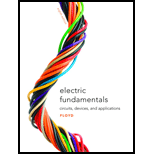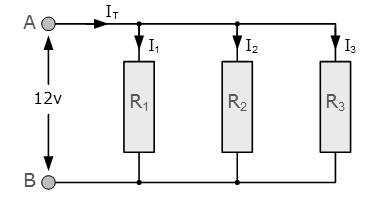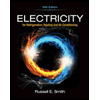1 Quantities And Units 2 Voltage, Current, And Resistance 3 Ohm's Law, Energy, And Power 4 Series Circuits 5 Parallel Circuits 6 Series-parallel Circuits 7 Magnetism And Electromagnetism 8 Introduction To Alternating Current And Voltage 9 Capacitors 10 Rc Circuits 11 Inductors 12 Rl Circuits 13 Rlc Circuits And Resonance 14 Transformers 15 Time Response Of Reactive Circuits 16 Diodes And Applications 17 Transistors And Applications 18 The Operational Amplifier 19 Basic Op-amp Circuits 20 Special-purpose Op-amp Circuits 21 Measurement, Conversion, And Control expand_more
Chapter Questions expand_more
Problem 1TFQ: Parallel resistors are always connected between the same pair of nodes. Problem 2TFQ: If one resistor is connected in series with a parallel Combination, the series resistor will always... Problem 3TFQ: In a series-parallel combinational circuit, the same current will always be in parallel resistors. Problem 4TFQ: A larger load resistor has a smaller loading effect on a circuit. Problem 5TFQ: When measuring de voltage, a DMM will normally have a small loading effect on a circuit. Problem 6TFQ: When measuring de voltage, the input resistance of a DMM is the same no matter on what scale it is... Problem 7TFQ: When measuring & voltage, the input resistance of an analog multimeter is the same no matter on what... Problem 8TFQ: A Thevenin circuit consists of a voltage source with a parallel resistor. Problem 9TFQ: The internal resistance of an ideal voltage source is zero. Problem 10TFQ: To transfer maximum power to a load, the load resistor should be twice the Thevenin resistance of... Problem 1ST: Which of the following statements are true concerning Figure 6-73? R1 and R2 are in series with R3,... Problem 2ST: The total resistance of Figure 6-73 can be found with which of the following formulas? R1+R2+R3R4R5... Problem 3ST: If all of the resistors in Figure 6-73 have the same value, when voltage is applied across terminals... Problem 4ST Problem 5ST: The parallel combination of a 330 resistor and a 470 resistor is in series with the parallel... Problem 6ST: In the circuit described in Question 5, the resistor(s) with the most voltage has a value of 1.0k... Problem 7ST Problem 8ST: The output of a certain voltage divider is 9V with no load. When a load is connected, the out-put... Problem 9ST Problem 10ST: When a load resistance is connected to the output of a voltage-divider circuit, the current drawn... Problem 11ST: The output voltage of a balanced Wheatstone bridge is equal to the source voltage equal to zero... Problem 12ST Problem 13ST: In a certain two-source circuit, one source acting alone produces 10 mA through a given branch. The... Problem 14ST Problem 15ST Problem 16ST: You are measuring the voltage at a given point in a circuit that has very high resistance values and... Problem 1TSC Problem 2TSC: Determine the cause for each set of symtims. Refer to Figure 6-74. FIGURE 6-74 The meters indicate... Problem 3TSC Problem 4TSC: Determine the cause for each set of symptoms. Refer to Figure 6-74. FIGURE 6-74 The meters indicate... Problem 5TSC Problem 1P: Identify the series and parallel relationships in Figure 6-75 as seen from the source terminals. Problem 2P: Visualize and draw the following series-parallel combinations: R1 in series with the parallel... Problem 3P: Visualize and draw the following series-parallel circuits: a parallel combination of three branches,... Problem 4P: In each circuit of Figure 6-76 identify the series and parallel relationship of the resistors viewed... Problem 5P: A certain circuit is composed of two parallel resistors. The total resistance is 667. One of the... Problem 6P: For the circuit in Figure 6-77, determine the total resistance between A and B. FIGURE 6-77 Problem 7P: Determine the total resistance for each circuit in Figure 6-76. FIGURE 6-76 Problem 8P: Determine the current through each resistor in Figure 6-75; then calculate each voltage drop. FIGURE... Problem 9P: Determine the current through each resistor in both circuits of Figure 6-76: then calculate each... Problem 10P: In Figure 6-78, find the following: total resistance between terminals A and B total current drawn... Problem 11P: In Figure 6-78, determine the current through R2 for VAB=6V. Problem 12P: In Figure 6-78, determine the current through R4 for VAB=6V. Problem 13P: A vlotage divider consists of two 56k resistors and a 15V soruce. Calculate the unloaded output... Problem 14P: A 12 V battery output is divided down to obtain two output voltages. Three 3.3k resistors are used... Problem 15P: Which will cause a smaller decrease in output voltage for a given voltage divider, a 10k. load or... Problem 16P: In Figure 6-79, determine the current drain on the battery with no load on the outpur terminals.... Problem 17P: Across which one of the following resistances will a voltmeter with a 10M internal resistance... Problem 18P: A certain voltage divider consists of three 1.0M resistors connected in series to a 100 V source.... Problem 19P: What is the difference between the measured and the actual unloaded voltage in Problem 18? Problem 20P: By what percentage does the voltmeter in Problem 18 alter the voltage which it measures? Problem 21P: A 10,000/VVOM is used on the 10 V scale to measure the output of a voltage divider. If the divider... Problem 22P: If a DMM with 10M input resistance is used instead of the VOM in Problem 21, what percentage of the... Problem 23P: A resistor of unknown value is connected to a Wheatstone bridge circuit. The bridge parameters for a... Problem 24P: A bridge network is shown In Figure 6-80. To what value must RV be set in order to balance the... Problem 25P: Determine the value of RX in the balance bridge in Figure 6-81. Problem 26P: Determine the outpur voltage of the unbalanced bridge in Figure 6-82 for a temperature of 65C. The... Problem 27P: Reduce the circuit in Figure 6-83 to its Thevenin equivalent as viewed from terminals A and B.... Problem 28P: For each circuit in Figure 6-84, determine the Thevenin equivalent as seen from terminals A and B. s Problem 29P: Determine the voltage and current for R1 in Figure 6-85. FIGURE 6-85 Problem 30P: Determin the value of a load resistor connected between terminals A and B in Figure 6-83 for maximum... Problem 31P: A certain Thevenin equivalent circuit has a VTH=5.5V and an RTH=75. To what value of load resistor... Problem 32P: Determine the value of RL in Figure 6-84(a) for which RL dissipates maximum power. Problem 33P: In Figure 6-86, use ther superposition therorem to find the current in R3. Figure 6-86 Problem 34P: In Figure 6-86, What is the curent through R2? FIGURE 6-86 Problem 35P: Is the voltmeter reading in Figure 6-87 correct? If not, what is the problem? FIGURE 6-87 a. Meter... Problem 36P: If R2 in Figure 6-88 opens, what voltages will be read at points A, B, and C? FIGURE 6-88 Problem 37P: Check the meter readings in Figure 6-89 and locate any fault that may exist. FIGURE 6-89 Problem 38P: Determine the voltage you would expect to measure across each resistor in Figure 6-88 for each of... Problem 39P: Determine the voltage you would expect to measure across cacti resistor in Figure 6-89 for each of... Problem 40P: In each circuit of Figure 6-90, identify the series and parallel relationships of the resistors... Problem 41P: Draw the schematic of the PC board layout in Figure 6-91 showing resistor values and identify the... Problem 42P: 1For the circuit shown in Figure 6-92, calculate the following: total resistance across the source... Problem 43P: Determine the total resistance and the voltage at points A, B, and C in the circuit of Figure 6-93. Problem 44P: Determine the total resistance between terminals A and B of the circuit in Figure 6-94. Also... Problem 45P: What is the voltage across each resistor in Figure 6-94? There are 10 V between A and B. FIGURE 6-94 Problem 46P: Determine the voltage, VAB. in Figure 6-95. FIGURE 6-95 Problem 47P: Find the value of R2 in Figure 6-96. FIGURE 6-96 Problem 48P: Determine the total resistance and the voltage at points A, B, and C in the circuit of Figure 6-97.... Problem 49P: Develop a voltage divider to provide a 6 V output with no load and a minimum of 5.5 V across a 1.0k... Problem 50P: Determine the resistance values for a voltage divider that must meet the following specifications:... Problem 51P: Using the superposition therorem, calculate the current in the right-most branch of Figure 6-98.... Problem 52P: Find the current through RL in Figure 6-99. FIGURE 6-99 Problem 53P: Using Thevenin’s theorem, find the voltage across R4 in Figure 6-100. FIGURE 6-100 Problem 54P: Determine VOUT for the circuit in Figure 6-101 for the following conditions: Switch SW2 connected to... Problem 55P: Develop a schematic for the double-sided PC board in Figure 6-102 and lable the resistor values.... Problem 56P: Lay out a PC board for the circuit in Figure 6-90(b). The battery is to be connected external to the... Problem 57P: The voltage divider in Figure 6-103 has a switched load. Determine the voltage at each tap (V1,V2,... Problem 58P: Figure 6-104 shows a dc biasing arrangement for a field-effect transistor amplifier. Biasing is a... Problem 59P: Look at the voltmeters in Figure 6-105 and determine if there is a fault in the circuit. If there is... Problem 60P: Are the voltmeter reading in Figure 6-106 correct? FIGURE 6-106 Problem 61P: There is one fault in Figure 6-107. Bases on the voltmeter indications, determine what the fault is.... Problem 62P: Look at the voltmeters in Figure 6-108 and determine if there is a fault in the circuit. If there is... Problem 63P: Determine the voltmeter reading in Figure 6-108 if the 4.7k resistor opens. FIGURE 6-108 Problem 64P: Open file P06-64; files are found at www.prenhall.com/floyd. Determine if there is a fault in the... Problem 65P: www.prenhall.com/floyd. 65. Open file P06-65 and determine if there is a fault in the circuit. If... Problem 66P: www.prenhall.com/floyd. 66. Open file P06-66 and determine if there is a fault in the circuit. If... Problem 67P: www.prenhall.com/floyd. 67. Open file P06-67 and determine if there is a fault in the circuit. If... Problem 68P: www.prenhall.com/floyd. 68. Open file P06-68 and determine if there is a fault in the circuit. If... Problem 69P: www.prenhall.com/floyd. 69. Open file P06-69 and determine if there is a fault in the circuit. If... Problem 70P: www.prenhall.com/floyd. 70. Open file P06-70 and determine if there is a fault in the circuit. If... Problem 71P: www.prenhall.com/floyd. 71. Open file P06-71 and determine if there is a fault in the circuit. If... format_list_bulleted


 Delmar's Standard Textbook Of ElectricityElectrical EngineeringISBN:9781337900348Author:Stephen L. HermanPublisher:Cengage Learning
Delmar's Standard Textbook Of ElectricityElectrical EngineeringISBN:9781337900348Author:Stephen L. HermanPublisher:Cengage Learning Electricity for Refrigeration, Heating, and Air C...Mechanical EngineeringISBN:9781337399128Author:Russell E. SmithPublisher:Cengage Learning
Electricity for Refrigeration, Heating, and Air C...Mechanical EngineeringISBN:9781337399128Author:Russell E. SmithPublisher:Cengage Learning
